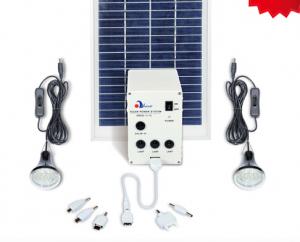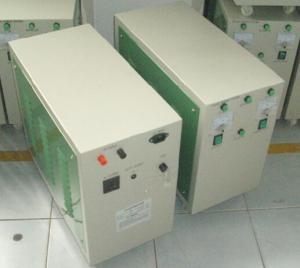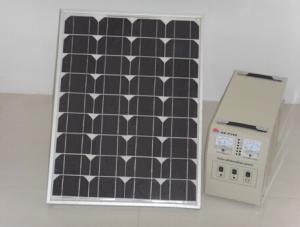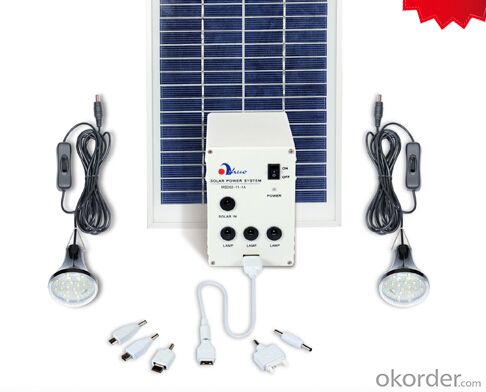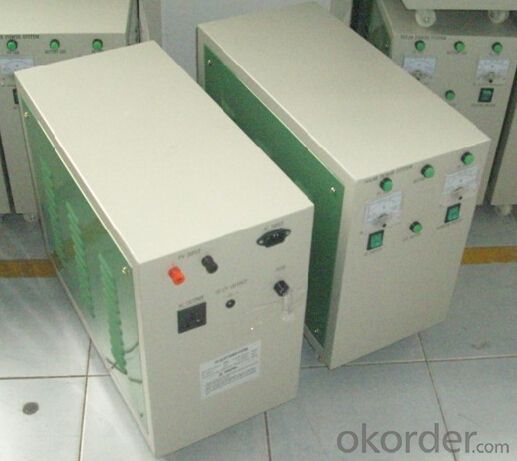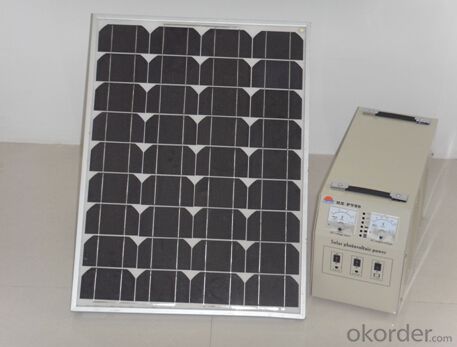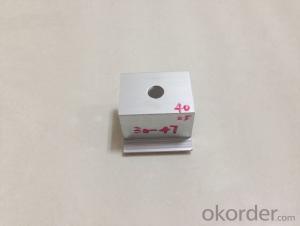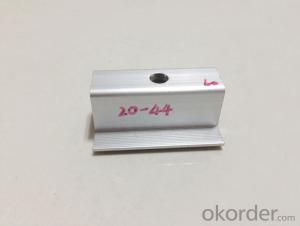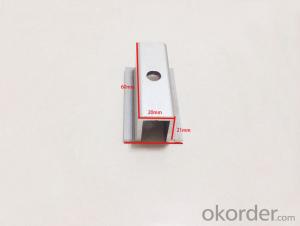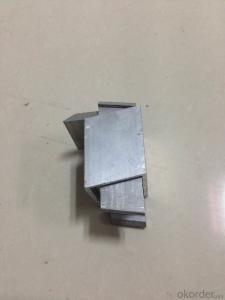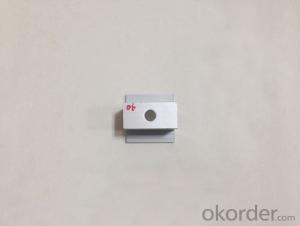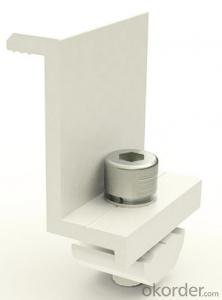Solar Mounting Spare Parts Inter Clamp
- Loading Port:
- China Main Port
- Payment Terms:
- TT or LC
- Min Order Qty:
- -
- Supply Capability:
- -
OKorder Service Pledge
OKorder Financial Service
You Might Also Like
Introduction of our company
We are the first solar racking system developer in China, who committed to solar racking system R&D, producing and marketing for about 10 years. We were the OEM for Sunpower, and are one of the largest rooftop solar racking system supplier in Japan and Australia now.
We persists in taking the path of specialization, scale and internationalization development. We import the international advanced technology equipment for manufacturing , assembling and testing. Frontier solar racking system is with own patents. The dynamic wind resistance reliability of our racking system can up to 270km/h. Therefore, superior product quality with more than 25 years' durability and perfect after-sale service have earned us a high reputation in PV industry worldwide.
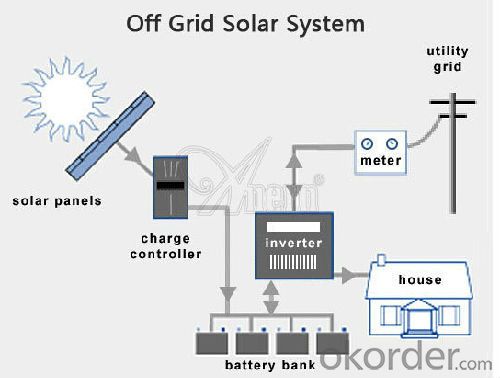
Working Principle of Solar Roof System
The stand alone Solar Home System is an off-grid solar system which uses batteries to store the solar energy. Stand alone solar system solutions design for those who are not able or willing to connect to electricity grid.
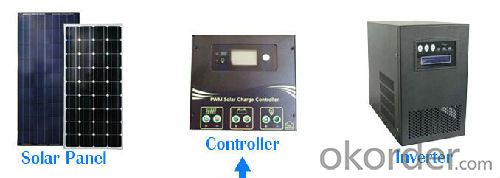
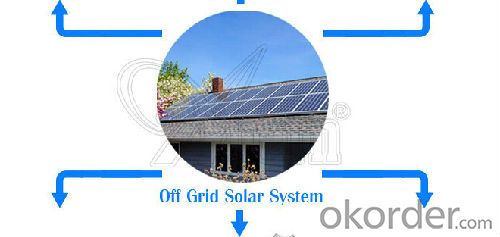

Specification of Solar Home System
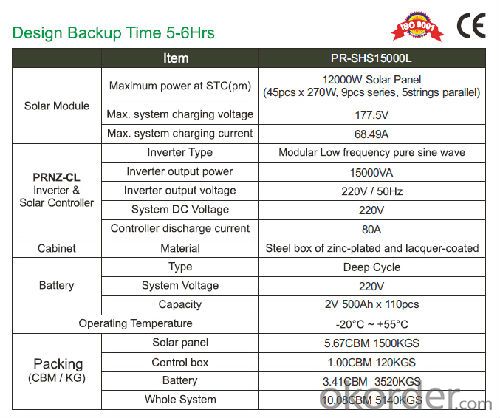
Product Features of Solar Home System
Off grid solar power system is mainly used for application with relatively-small power consumption, and the areas have no grid network coverage, or grid power is unstable or outage condition.
It’s composed of solar panels, hybrid solar inverter, battery bank, solar panel mounting racks, and other accessories required fora complete home solar power system.
The battery bank gives a stable power output to the solar inverter which converts DC to AC to power loads, and provides power backup in rainy or cloudy days.
The solar panels generate electricity at daytime and charge the battery bank.
The off grid home solar power system provides grid power bypass in case of battery power shortage when sunshine is not enough.
All the off grid home solar power system configurations are worked out by scientific calculation and design.
Advantage of Our Solar Home System
1. solar power system operation can automatically control and manual control modes.
2. Easy installation, energy saving (saving coal and petroleum resources, reduce pollution / noise emissions); do not need to lay long-distance transmission lines, do not build large substation, system stability, less maintenance, low maintenance cost, daily / each month / year electricity clearly visible, and can be entered into the computer record.
This solar system configuration is for reference. It can be adjusted based on actual condition and requirement. All parts have been tested and proven in actual operation with enough reliability and stability. It’s suggested to source whole system as a pack from us to guarantee the system compatibility.
Terms and Conditions
1. Trade terms: FOB Shanghai
2. Payment terms: 30% T/T, balanced before shipment/ LC at sight before shipment. Actual Terms can be negotiated for big order.
3. Package: Exported standard package suitable for tough handling and sea transport.
4. Delivery: Goods to be ready within 10~30 days depending on order quantity.
5. Warranty: 10 years for solar panel, 2 years for controller/inverter/battery.
FAQ
Q: Could you introduce the background of your company?
A: We are a Group corp. with 1GW capacity in China, which is Okorder’s registered VIP Supplier, possess Financial Service from Okorder.com.
Q: Required mainly certificates (CE&IEC/TUV/RoHS)?
A: Our products are certificated by CE RoHS, IEC, ISO, TUV, UL etc.
Q: Your main exported market is?
A: Main markets of our products is: South-east Asia, Mid-east, Arica, East Europe and Latin America.
- Q: Can solar energy systems be used in areas with high rainfall?
- Yes, solar energy systems can be used in areas with high rainfall. While excessive rainfall may temporarily reduce the amount of sunlight reaching the solar panels, modern solar technologies are designed to generate electricity even in low light conditions. Additionally, solar energy systems can still produce electricity during cloudy or rainy days, although at a slightly reduced efficiency compared to sunny days. Therefore, solar energy systems can still be effectively utilized in areas with high rainfall.
- Q: Can solar energy systems be used in areas with limited access to solar energy system financing options?
- Yes, solar energy systems can still be used in areas with limited access to solar energy system financing options. There are alternative financing options available such as leasing, power purchase agreements, or community solar programs that can help make solar energy systems more affordable and accessible in these areas. Additionally, government incentives, grants, and subsidies can also be utilized to offset the upfront costs of installing solar energy systems in such areas.
- Q: Can solar energy systems be used for powering emergency response systems?
- Yes, solar energy systems can definitely be used for powering emergency response systems. Solar power is a reliable and sustainable source of energy that can be harnessed to provide electricity to critical infrastructure during emergencies. These systems can be installed in various emergency response facilities such as command centers, hospitals, fire stations, and communication towers. One of the key advantages of solar energy systems is their ability to provide power even when the grid is down or damaged. During emergency situations like natural disasters or power outages, traditional electricity sources may become unavailable or unreliable. Solar power, on the other hand, relies on sunlight and can continue to generate electricity as long as there is sunlight available. Solar energy systems can be equipped with battery storage, allowing the excess energy generated during the day to be stored and used during the night or during cloudy weather. This ensures a continuous and uninterrupted power supply to emergency response systems, enabling them to operate efficiently and effectively. Moreover, solar energy systems have a relatively low maintenance requirement and are long-lasting, making them suitable for emergency response applications. They also reduce dependency on fossil fuels and help mitigate the environmental impact associated with traditional energy sources. In summary, solar energy systems can be an ideal solution for powering emergency response systems. Their ability to provide reliable and sustainable electricity, even in the absence of a functioning grid, makes them a valuable asset during critical situations.
- Q: Can solar energy systems be used for powering electric vehicle sharing programs?
- Yes, solar energy systems can be used to power electric vehicle sharing programs. Solar panels can generate clean and renewable energy to charge the electric vehicles, reducing dependence on fossil fuels and lowering carbon emissions. By utilizing solar energy, these programs can become more sustainable and environmentally friendly.
- Q: Is it possible to store excess electricity generated by a solar energy system?
- Yes, it is possible to store excess electricity generated by a solar energy system. One common method of storage is through the use of batteries. Solar energy systems can be equipped with battery banks that store the excess electricity generated during the day for use during the night or when there is low sunlight. These batteries can be charged and discharged as needed, providing a reliable and continuous power supply even when the sun is not shining. Another method of storing excess electricity is through grid-tied systems. In this setup, when the solar energy system generates more electricity than is being used, the excess power is fed back into the electrical grid. This excess power is credited to the homeowner's account, and they can use these credits to draw electricity from the grid during times when their solar panels are not producing enough power, such as at night or during cloudy days. Both battery storage systems and grid-tied systems provide a way to store and utilize excess electricity generated by a solar energy system, ensuring that no energy goes to waste and enabling homeowners to have a reliable and uninterrupted power supply.
- Q: Can solar energy systems be used for powering off-grid telecommunications networks?
- Yes, solar energy systems can be used effectively for powering off-grid telecommunications networks. Solar panels can generate electricity from sunlight, which can then be stored in batteries for use during periods of low or no sunlight. This renewable energy source provides a reliable and sustainable power solution for off-grid telecommunications networks, ensuring continuous operation even in remote locations without access to traditional power grids. Additionally, solar energy systems are cost-effective and environmentally friendly, making them a preferred choice for powering off-grid telecommunications networks.
- Q: Can solar energy systems be used in areas with limited access to solar energy publications and resources?
- Yes, solar energy systems can be used in areas with limited access to solar energy publications and resources. While access to information and resources can enhance the installation and maintenance of solar energy systems, it is not an absolute requirement. Basic knowledge and technical support from experts can help overcome the lack of resources in such areas. Additionally, advancements in technology and the increasing availability of online resources can also aid in bridging the knowledge gap for those in remote or underserved areas.
- Q: Can solar energy systems be used for powering off-grid water treatment plants?
- Yes, solar energy systems can be used for powering off-grid water treatment plants. Solar panels can be used to generate electricity, which can then be used to power the water treatment processes such as filtration, disinfection, and pumping. This allows off-grid water treatment plants to operate independently without relying on traditional power sources, making solar energy a sustainable and efficient option for powering these facilities.
- Q: Can solar energy systems be installed on sports stadiums?
- Yes, solar energy systems can be installed on sports stadiums. Many sports stadiums around the world have successfully implemented solar energy systems to generate renewable and clean electricity. These systems are typically installed on the roofs of stadiums or in nearby open areas to maximize sunlight exposure. By harnessing solar power, sports stadiums can reduce their reliance on fossil fuels, lower their carbon footprint, and contribute to a more sustainable future.
- Q: What is a photovoltaic system?
- The technology known as a solar PV system, or photovoltaic system, converts sunlight into electricity. It utilizes solar panels to capture and convert the energy from the sun into direct current (DC) electricity. An inverter is then used to transform this DC electricity into alternating current (AC), which can be used in homes, businesses, and industries. At the heart of a photovoltaic system is the solar panel, which is composed of interconnected solar cells. These cells, typically made from semiconductor materials like silicon, produce an electric current when exposed to sunlight. The amount of energy generated by the solar cells is directly linked to the intensity of sunlight, making the system most effective in areas with ample sunshine. In addition to the solar panels, a photovoltaic system includes other essential components. These include mounting structures to secure the panels, a solar charge controller to regulate electricity flow, batteries for energy storage, and an inverter to convert DC electricity to AC electricity. The system may also incorporate a meter for measuring electricity generation and consumption. Photovoltaic systems offer numerous advantages. They provide a clean and renewable energy source, reducing reliance on fossil fuels and minimizing environmental impact. They also offer long-term cost savings as they generate electricity without ongoing fuel costs. Furthermore, photovoltaic systems can be scaled, allowing for installation on a small scale for residential use or on a larger scale for commercial or utility applications. Overall, photovoltaic systems have gained popularity as a sustainable and efficient method of generating electricity. Their widespread adoption has contributed to the shift towards a greener and more environmentally friendly energy landscape.
Send your message to us
Solar Mounting Spare Parts Inter Clamp
- Loading Port:
- China Main Port
- Payment Terms:
- TT or LC
- Min Order Qty:
- -
- Supply Capability:
- -
OKorder Service Pledge
OKorder Financial Service
Similar products
Hot products
Hot Searches
Related keywords
